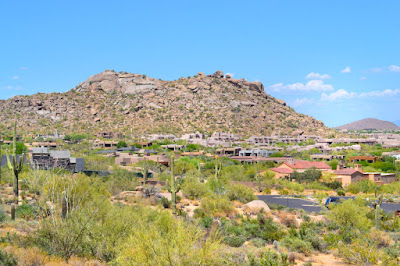Is This "Climate Departure"?
In 2013, climate scientists at the University of Hawaii, analyzing a small mountain of recent data, discerned change afoot. They named it "climate departure." It is a region's departure from its previous climate to a new, considerably hotter climate. After the departure point, there would be no more cold years. Every year after departure would be hotter than the hottest year pre-departure.
The scientists thought departure could set in during the early 2020s, around 2023. It would begin in equatorial/tropical regions including the Caribbean and Central America, possibly the southern US included. Over the following 20 to 25 years departure would spread to the temperate zones.
Phoenix, Arizona, considered America's hottest city, is already reeling from never before experienced heat.
A surge in heat-related deaths amid record-breaking summer temperatures offers a “glimpse into the future” and a stark warning that one of America’s largest cities is already unlivable for some, according to its new heat tsar.Scorching temperatures have made summers increasingly perilous for the city’s 1.4 million people, with mortality and morbidity rates creeping up over the past two decades, but 2020 was a gamechanger when heat related deaths jumped by about 60%.
Last year, after another deadly summer, the mayor announced the region’s first dedicated unit to tackle the growing hazard of urban heat, which also threatens the city’s economic viability.
Climate stresses are raising the stakes. Rising temperatures require farmers to use more water to grow the same amount of crops. Prolonged and severe droughts decrease available supplies. Wildfires are burning hotter and lasting longer. Fires bake the soil, reducing forests’ ability to hold water, increasing evaporation from barren land and compromising water supplies.


climate departure
ReplyDeletetipping point
turning point
point of no return
"shaka when the walls fell"
and as i see it
"Gaia when her heart broke"
like it or not
all our hearts get broken that day
Climate science has become one of the most frustrating and unrewarding callings. Burn out levels are high. Some just give up and find a teaching job at a community college.
ReplyDeleteI do recall Lovelock's analysis that Gaia maintains stability until there is a tipping point, then undergoes rapid shifts to attain a new (hotter or colder) stable state.
ReplyDeleteTrue enough, NPoV. Yet we have a civilization that came into being in the Holocene now struggling to reject the new era, the Anthropocene. Adaptation is for losers.
Delete